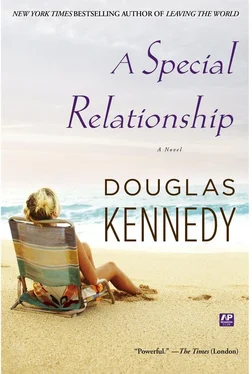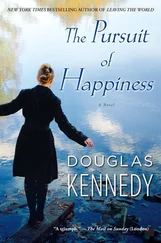'Mrs Goodchild... though I can fully understand your worry - what mother wouldn't be worried under the circumstances? - I am simply not in a position to speculate about such matters. Because that is Dr Reynolds's territory'.
'But do you think that the EEG results... ?'
'Yes, they do give one cause for optimism. Now, would you mind if I looked at Mr Kerr's handiwork?'
The unit sister drew the curtains around my bed, and helped me raise my nightgown and lower my underwear. Then she pulled away the bandages. I hadn't seen my wounds since the delivery, and they shocked me: a crisscrossing sequence of railroad tracks, bold in their delineation and barbaric in execution.
Though I was trying my best to stifle all emotion, I couldn't help but emit a small sharp cry. Mr Hughes favoured me with an avuncular smile, and said, 'I know it looks pretty grim right now - a real war wound - but once the stitches are removed, I promise you that your husband won't have anything to complain about'.
I wanted to say, 'To hell with my husband. It's me who's going to have to live with the disfigurement'. But I kept my mouth shut. I couldn't afford to deepen my problems.
'Now I gather you've been having a bit of, uh, shall we say, emotional disquiet'.
'Yes - but it's over with'.
'Even though you had to be sedated yesterday?'
'But that was yesterday. I'm just fine now'.
The unit sister leaned over and whispered something in Hughes's ear. He pursed his lips, then turned back to me and said, 'According to the staff here, you had a bit of a turn this morning'.
'It was nothing'.
'You know, there's absolutely no shame in going a little wonky after giving birth. Quite commonplace, actually, given that one's hormones are just a little all over the place. And I do think that a course of anti-depressants...'
'I need nothing, doctor - except to see my son'.
'Yes, yes - I do understand. And I'm sure sister here can arrange to have you brought upstairs once we're done. Oh - and you do know that you will be with us for at least another six to seven days. We want to make certain you're right as rain before sending you out into the world again'.
He scribbled some notes on to my chart, spoke quickly to the unit sister, then turned back to me with a farewell nod.
'Good day, Mrs Goodchild - and try not to worry'.
That's easy for you to say, pal.
A half-hour later - after having my surgical dressings changed - I was up in Paediatric ICU. Once again, I followed the advice of that benevolent porter and I kept my eyes firmly focused on the linoleum as I was wheeled in. When I finally looked up, the sight of Jack made my eyes sting. Not that there was any change in his condition. He was still enveloped in medical tubes, still dwarfed by the plexiglas incubator. Only now I had a desperate need to hold him, to cradle him. Just as I had a despondent fear that I might just lose him. Or that he would have to go through life with a terrible mental disability. Suddenly, I knew that whatever happened to him - whatever horrors were revealed by the MRI - I'd handle it. Or, at least, I'd deal with it - the way you deal with life's most unexpected, fiendish cards. But, oh God, how I didn't want that to come to pass; how I'd do anything now to make certain he was going to be all right... and how I knew just how powerless I was to change anything now. What had happened happened. We were now nothing more than fortune's fools - and hostages to whatever came our way.
I started to weep again. This time, however, I didn't feel the undertow of emotional hollowness that had so characterized the past few days. This time, I simply wept for Jack - and for what might become of him.
The orderly kept his distance while I cried. But after a minute or so, he approached me with a box of Kleenex and said, 'It might be best if we head back now'.
And he returned me to my room.
'Good news', Nurse Dowling said after I was helped back into bed. 'Mr Hughes says you can come off those nasty drips - so it looks like you're tube free. First steps towards freedom, eh? How's the little one doing?'
'I don't know', I said quietly.
'I'm sure he's going to be just fine', she said, her singsong platitudinous voice now sounding like fingernails on a blackboard. 'Now what can I get you for lunch?'
But I refused all food, refused a rental television, refused the offer of a sponge bath. All I wanted was to be left alone - to lie in bed with the blankets pulled up to my chin, shutting out the cacophony of the world.
That's how I passed my day - counting down the hours until Tony finally arrived and the paediatrician presented us with the empirical proof of our son's condition. I was conscious, but purposely detached from everything around me. Or, at least, I thought it was a deliberate detachment on my part. But, at times, I really did feel as if an occupying power had taken up residence in my brain, encouraging me to push away the world and all its complexities.
Then it was six o'clock. Much to my surprise, Tony showed up exactly when he said he would, bearing a bouquet of flowers and a nervousness which I found immediately endearing.
'Were you sleeping?' he asked, sitting down on the edge of the bed and kissing my forehead.
'A facsimile of sleep', I said, forcing myself to sit up.
'How are you faring?'
'Oh, you know - Day of the Living Dead'.
'Any news from upstairs?'
I shook my head. And said, 'You look tense'.
Tony just smiled a stiff smile and lapsed into silence. Because there was nothing to say until the paediatrician made his appearance. Or perhaps anything we did say would have sounded irrelevant and empty. Our shared anxiety was so palpable that saying nothing was the smartest option.
Fortunately, this silence only lasted a minute or so, as a new nurse came by and said that Dr Reynolds would like to see us in a consulting room by the MRI suite on the fifth floor. Tony and I exchanged a nervous glance. Requesting us to meet him in a private consulting room could only mean bad news.
Once again I was helped into a wheelchair. Only this time Tony pushed me. We reached the elevator. We travelled up three storeys. We headed down a long corridor. We passed the suite of rooms marked MRI and were escorted into a small consulting room, with nothing more than a desk, three chairs, and a light box for x-rays. The porter left us. Tony pulled over a chair next to my wheelchair and did something he'd not done before: he took my hand. Oh, we had held hands on occasion - by which I mean two or three times maximum. This was different. Tony was trying to be supportive - and, in doing so, he was letting me know just how scared he was.
After a moment, Dr Reynolds came in, carrying a folder and a large oversized manila envelope. He was a tall soft-spoken man in his late thirties. I tried to read his face - the way a person on trial tries to read the face of the foreman before the verdict was delivered. But he was giving nothing away.
'Sorry to have kept you both...' he said, opening the envelope, clipping the MRI film to the light box, and illuminating it. 'How are you feeling, Ms Goodchild?'
'Not bad', I said quietly.
'Glad to hear it', he said, favouring me with a sympathetic smile that let it be known he was au fait with my recent follies.
'How's our son, Doctor?' Tony asked.
'Yes, I was just about to come to that. Now... this is a picture of your son's brain', he said, pointing to the MRI film... which, to my untutored eye, looked like the cross-section of a mushroom. 'And after consultation both with the paediatric neurologist and the radiologist, we've all reached the same conclusion: this is a perfectly normal infant brain. Which, in turn, means that, based on this MRI - and the recent EEG - we sense that there has been no brain damage'.
Читать дальше












